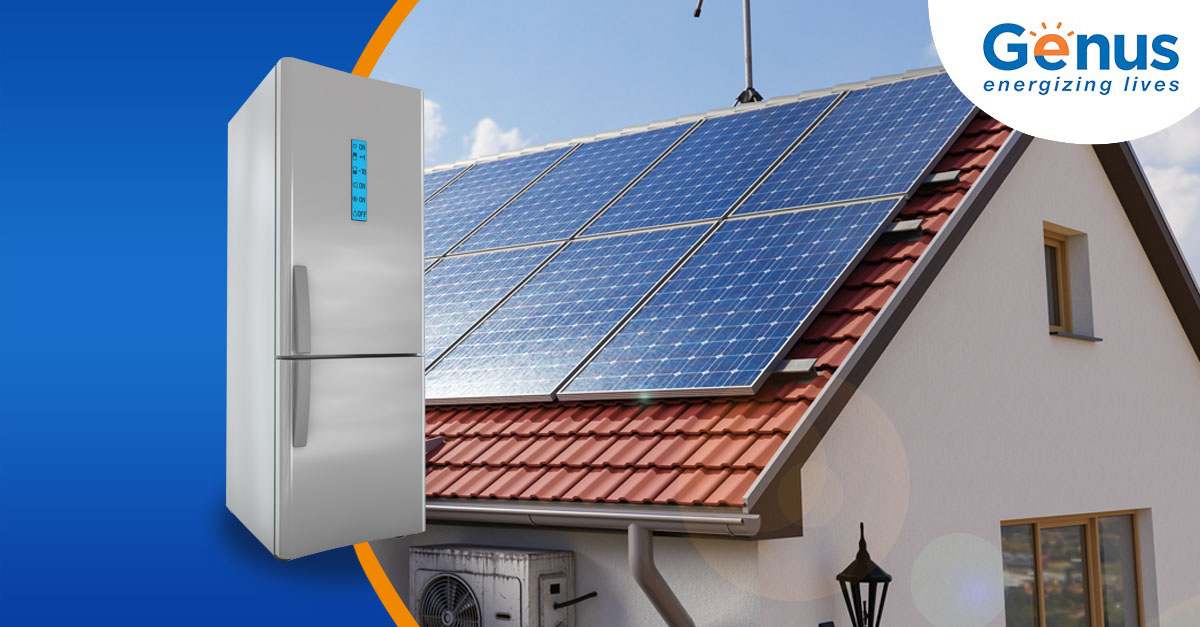
Solar power is becoming increasingly popular among Indians, especially as a way to power household appliances, such as freezers, which use up a lot of electricity. However, you need to be aware of how to set up the right solar power system if you want renewable energy running your freezer.
If you have an on-grid solar system, and you have wondered “how much solar power I need to run a refrigerator”, you would be pleased to know that you can operate a freezer in a straightforward manner. You just need to contact a provider of solar panels and have them install the same at your home.
But, if you are reliant on an off-grid solar system that you installed yourself, you need to consider these crucial factors in order to ensure that your freezer remains functional even during cloudy days.
Determining the Power Consumption of Solar Freezers and Refrigerators
Your freezer’s nameplate rating label will most likely feature the power consumption details. You can check the body of the refrigerator for this label, which mentions the voltage and current requirements of the device. Multiply the two values, and this will give you the required number of watts.
For instance, if your refrigerator mentions 4.5 amps of current and 120 volts, your requirement for the solar power appliance in watts would be 540.
Battery Size for Solar-Powered Refrigerator Freezer
Around 1400 watt-hours of power can be stored in a medium-sized battery. Since it is recommended that you keep your batteries at least half full at all times, you have around 720 watt-hours of power that is usable.
Ensure that you pick a battery with high capacity because the sun might not shine every day.
Note: If you wish to run your solar freezer for 4 days, and the device takes up 840 watts a day, you need to generate and store around 3400 watts at least.
Inverter Requirements
An inverter turns DC from the sunlight into usable AC. Pick an inverter that has a high efficiency rating, or you will end up with a lot of wasted energy. It is worth noting that cheap, inefficient inverters could cost you around half of the electricity that you generate.
Also Read: A Practical Guide to Choosing the Right Solar Inverter
Battery Calculation for Solar Panel Freezer
Large batteries are more durable and last longer, so you need to prioritize buying them. Although the smaller batteries are cheaper and more compact and better suited for a portable solar freezer, they are unreliable for long-term use.
If you want 3400 watts, you need 3 batteries of 1400 watt-hours each. If you want to be on the safe side by never using the batteries past half their capacity, you may require 6 batteries.
Note: Do not connect many batteries in parallel, as it is detrimental to battery health.
Also Read: Best Ways to Charge Inverter Battery When You Don’t Have Power
How many Solar Panels are Needed for Powering a Refrigerator Freezer?
On an average sunny day, with 5 hours of sunshine, you will end up generating around 375 watts. This is because a 100-watt solar panel can generate 75 watts/ hour of electricity.
Therefore, you require 8-10 units of 100-watt solar panel to run the freezer if you wish to generate 3400 watt-hours over four days.
Pricing Details of the Solar System
An off-grid setup for running a solar-powered fridge freezer is perfect for you, especially if you reside in a remote area or face many power outages. However, if you do not fall under these categories, you may find it to be a huge investment. This is after taking into account the cost of solar panels, batteries, inverters, etc. just to run a freezer. In that case, you might be better off with an on-grid system that uses the electricity grid as a backup.
Conclusion
While it may not be easy to determine how to run a freezer on solar power, you can certainly achieve that by following the instructions given above. However, to achieve optimal efficiency, ensure you use the right components and perform the calculations meticulously.
If you need further guidance or want to purchase a component for making your vision of a solar freezer a reality, feel free to reach us.
